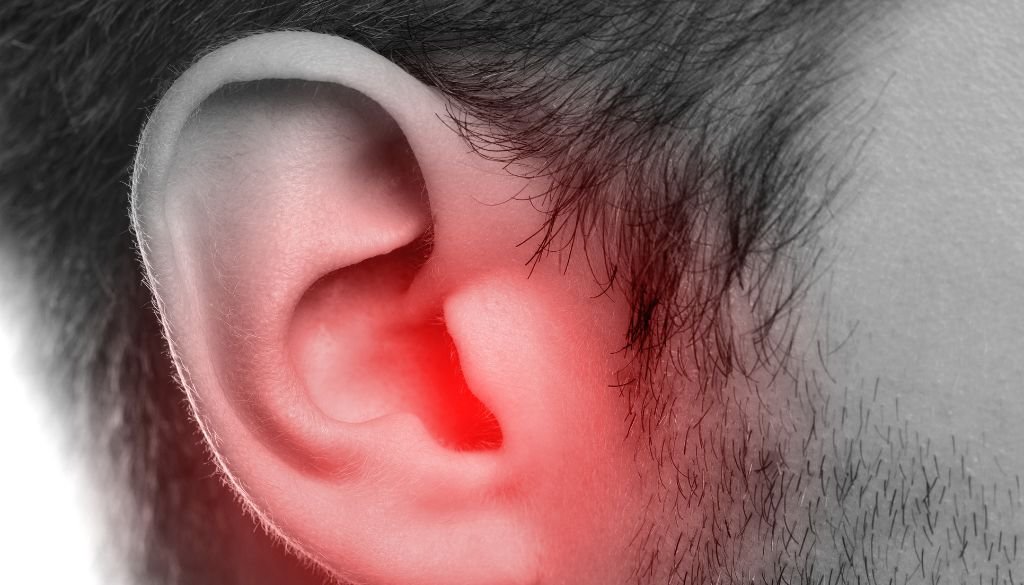Does tinnitus last forever? This question is critical for individuals experiencing ‘new onset’ tinnitus, which refers to the first six months of the condition. Tinnitus, a symptom of an underlying issue, varies in intensity and duration. For many, tinnitus improves over time during this initial period and does not become a persistent issue. However, some people experience long-term or chronic tinnitus, necessitating effective management strategies.

Understanding the nature of tinnitus and its potential to become a lasting condition is essential. While many individuals find that their symptoms diminish with time, others may need to explore various management techniques to cope with ongoing tinnitus. This article will discuss the likelihood of tinnitus persisting indefinitely and provide insights into managing it if it becomes a chronic condition.
Key Takeaways:
- Tinnitus can improve for many individuals in the “new onset” stage over time.
- Some people experience long-term or chronic tinnitus.
- Effective management techniques are essential for coping with chronic tinnitus.
- Understanding the underlying causes of tinnitus is crucial for appropriate treatment approaches.
- Seeking professional help can provide valuable resources and support for individuals with tinnitus.
What Causes Tinnitus?
Tinnitus is not a condition itself but a symptom of an underlying condition. It can be caused by a variety of factors, including the following:
- Hearing Loss: One of the primary causes of tinnitus is hearing loss. When the delicate hair cells in the inner ear are damaged or destroyed, it can lead to hearing loss and tinnitus.
- Earwax Buildup: Excessive earwax can block the ear canal and cause tinnitus symptoms. Removing the earwax can often alleviate the problem.
- Age-Related Changes: As we age, the structures in the ear can deteriorate, leading to tinnitus. This natural ageing process can reduce hearing and the perception of ringing or buzzing sounds.
- Head or Neck Injuries: Traumatic injuries to the head or neck can damage the auditory system and trigger tinnitus. Concussions, whiplash, and other forms of physical trauma can disrupt the delicate balance of the inner ear.
- Ototoxic Medications: Certain medications, such as high doses of aspirin, nonsteroidal anti-inflammatory drugs (NSAIDs), and some antibiotics and cancer drugs, have been linked to tinnitus as a potential side effect.
Understanding the underlying cause of tinnitus is crucial for determining the appropriate treatment approach. Healthcare professionals can develop personalized strategies to manage tinnitus effectively by identifying the specific factors contributing to the condition.
Is Tinnitus Curable, or Does It Ever Go Away?
Tinnitus, the perception of sound without an external source, can be a distressing and persistent condition for many individuals. The question of whether tinnitus is curable or if it ever goes away is a common concern. While there is no definitive cure for tinnitus, the outcome can vary depending on the underlying cause and individual factors.
For some individuals, tinnitus may go away independently if the underlying cause can be identified and treated. This can include addressing issues such as earwax buildup, certain medications, or temporary exposure to loud noise. In these cases, once the underlying cause is resolved, the tinnitus may dissipate over time.
However, for many people, tinnitus is a chronic condition that requires management rather than a complete cure. The American Academy of Otolaryngology states that if tinnitus has persisted for more than two years, it is considered chronic. While complete eradication of tinnitus may not be possible, various treatment options and management strategies are available to help individuals cope with and minimize the impact of tinnitus on their daily lives.
Tinnitus Treatments and Management Strategies
When it comes to managing tinnitus, a multidisciplinary approach is often recommended. Here are some treatment options and management strategies that can help:
- Sound therapy: Using external noise sources or hearing aids with tinnitus relief features can help mask the tinnitus and make it less noticeable. This can provide relief and help individuals focus on other sounds.
- Cognitive behavioural therapy: This therapeutic approach can help individuals alter their thoughts and reactions to tinnitus, reducing stress and improving overall coping mechanisms.
- Stress management techniques: Finding ways to reduce stress levels can alleviate tinnitus symptoms. Relaxation exercises, mindfulness practices, and engaging in enjoyable activities are all beneficial.
- Support groups: Connecting with others who experience tinnitus can provide valuable support, resources, and a sense of community. Sharing experiences and learning from others can be empowering.
It’s important to remember that what works for one person may not work for another, and finding the right combination of treatments and management strategies may require some trial and error. Seeking professional help from an ENT specialist or audiologist specialising in tinnitus can provide guidance and personalized recommendations based on individual needs and circumstances.

How to Manage Tinnitus
Living with tinnitus can be challenging, but there are various strategies and techniques that can help individuals effectively manage the condition and improve their quality of life. Here are some coping strategies and management techniques:
1. Sound Therapy:
Sound therapy is a popular approach for managing tinnitus. It involves using external noise sources to mask or distract from the phantom tinnitus sounds. This can include listening to soothing music, white noise machines, or specialized tinnitus relief apps. Additionally, hearing aids with built-in sound therapy features can provide relief by amplifying external sounds and reducing the perception of tinnitus. Sound therapy can help individuals refocus their attention away from the tinnitus, making it less noticeable and bothersome.
2. Stress Management:
Stress can exacerbate tinnitus symptoms, so implementing stress management techniques is crucial. Engaging in activities such as deep breathing exercises, meditation, or yoga can help reduce stress levels and promote relaxation. Identifying and avoiding situations that trigger stress whenever possible is important. By managing stress effectively, individuals can minimize the impact of tinnitus on their daily lives.
3. Support Groups:
Seeking support from others who understand what it’s like to live with tinnitus can be invaluable. Joining support groups or online communities can provide a sense of belonging and a safe space to share experiences and coping strategies. Support groups also offer an opportunity to learn from others who have successfully managed their tinnitus and to gain insights into potential treatments or resources.
By implementing these coping strategies and management techniques, individuals with tinnitus can take control of their condition and improve their overall well-being. It’s essential to consult with a healthcare professional to develop a personalized management plan that suits individual needs and preferences.

Tinnitus Treatment Options
When it comes to treating tinnitus, several options are available to help individuals manage and cope with this condition. A comprehensive hearing evaluation is typically the first step in identifying any underlying hearing loss that may be contributing to tinnitus. This evaluation is performed by an ENT specialist or an audiologist, who will determine the most suitable course of action.
In many cases, hearing aids are recommended as part of the treatment plan for tinnitus. These devices not only address the hearing loss but also provide relief from the tinnitus itself. Hearing aids with tinnitus relief features, such as sound therapy signals, can help mask the phantom sounds and make them less noticeable. They provide a more pleasant auditory experience, allowing individuals to regain control of their lives and improve their overall well-being.
Read Also: Does Cortexi work for hearing loss?
In addition to traditional hearing aids, there are specialized tinnitus relief hearing aids available. These devices are specifically designed to provide targeted relief for tinnitus symptoms. They offer various features, such as customized sound therapy programs and advanced amplification techniques, which help individuals manage their tinnitus more effectively. These tinnitus-relief hearing aids are an excellent option for those who experience significant distress from their tinnitus and are seeking dedicated treatment.
Hearing Evaluation: The First Step
A hearing evaluation is crucial in determining the appropriate treatment approach for tinnitus. By assessing the individual’s hearing abilities, an ENT specialist or audiologist can identify any underlying hearing loss and tailor the treatment plan accordingly. This evaluation involves a series of tests and assessments to measure different aspects of hearing, such as pure-tone audiometry and speech recognition.
Habituation Therapy: Retraining the Brain
Habituation therapy is another treatment option for tinnitus. It aims to retrain the brain’s response to the phantom sounds, helping individuals habituate to and cope with their tinnitus. This therapy involves sound-based techniques, such as using low-level, soothing sounds to distract the brain from focusing on the tinnitus. Over time, the brain learns to filter out the tinnitus signals, reducing perception and distress.
The Role of Sound Therapy in Tinnitus Treatment
Sound therapy is a fundamental component of tinnitus treatment, aiming to alter the perception and reactions to the phantom sound for clinical benefit. It has been used since the 1970s and offers various forms of relief, including total masking and partial masking. Total masking involves using an alternative stimulus to cover up the tinnitus, effectively reducing its prominence in the individual’s perception. On the other hand, partial masking adds an alternative stimulus that helps reduce the focus on the tinnitus, making it less bothersome.
For individuals with tinnitus, sound therapy can be achieved through different methods. One effective approach is using hearing aids equipped with built-in sound therapy signals. These hearing aids provide not only amplification for environmental sounds but also additional therapeutic sounds that help mask the tinnitus. By incorporating these therapy signals into the hearing aids, individuals can experience relief and improved daily functioning.
Can smoking cause tinnitus? Our exclusive feature examines the potential link between tobacco use and auditory health, providing a thorough analysis.
Additionally, sound therapy can be delivered through external noise sources, such as white noise machines or sound generators. These devices emit soothing sounds that help distract the individual from the tinnitus and promote relaxation. Some individuals benefit from using sound pillows or pillow speakers that deliver sound therapy signals directly to the ears while they sleep, helping them achieve a restful night’s sleep.
Sound therapy plays a crucial role in tinnitus treatment by utilizing alternative sounds to mask or reduce the focus on the phantom sound. Whether through the use of hearing aids with built-in therapy signals or external noise sources, sound therapy offers relief and improved quality of life for individuals with tinnitus.
Conclusion
While tinnitus may not always go away and may require long-term management, effective treatments and coping strategies are available to relieve and improve quality of life. Understanding the underlying causes, seeking professional help, and utilizing sound therapy techniques can significantly reduce the impact of tinnitus on daily living.
With the right approach, individuals can learn to live with tinnitus and regain control of their lives. Tinnitus relief is possible through various management techniques, such as sound therapy, stress management, and support from organizations and support groups.
By addressing the underlying causes of tinnitus through comprehensive hearing evaluation and fitting with appropriate hearing aids, individuals can experience significant relief. The use of hearing aids with tinnitus relief features can help mask the tinnitus and make it less noticeable. Also, habituation therapy and retraining the brain’s response to tinnitus can improve tinnitus management.
In conclusion, while tinnitus may be a persistent condition, numerous tinnitus management techniques are available to relieve and improve the overall well-being of individuals living with tinnitus. By understanding the causes of tinnitus and utilizing appropriate treatments and coping strategies, individuals can find relief and regain control over their lives.
Frequently Asked Questions
Does tinnitus last forever?
Tinnitus can be long-term or chronic for some individuals, but for many people in the “new onset” period, it can improve over time and not become a persistent issue.
What causes tinnitus?
The most common causes of tinnitus include hearing loss, earwax buildup, age-related changes to the hearing nerve, head or neck injuries, and certain medications.
Is tinnitus curable, or does it ever go away?
Sometimes, tinnitus may go away independently if the underlying cause is identified and treated. However, for many individuals, tinnitus is a chronic condition that requires management rather than a cure.
How can tinnitus be managed?
Effective management strategies for tinnitus include sound therapy, stress management techniques, and seeking support from organizations and support groups.
What are the treatment options for tinnitus?
Treatment options for tinnitus include addressing underlying hearing loss through a comprehensive hearing evaluation and fitting with appropriate hearing aids. Habituation therapy can also help individuals manage and cope with tinnitus.
What is the role of sound therapy in tinnitus treatment?
Sound therapy aims to alter the perception and reactions to tinnitus for clinical benefit. It can involve total masking or partial masking to provide relief for individuals with tinnitus.
Is there any conclusion to managing tinnitus?
While tinnitus may not always go away and may require long-term management, effective treatments and coping strategies are available to provide relief and improve quality of life. With proper management, individuals can learn to live with tinnitus and regain control of their lives.



